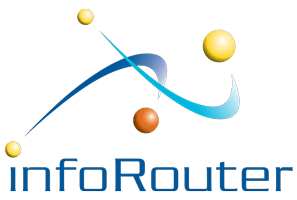Form Templates in infoRouter
infoRouter form templates provide a powerful and flexible way to create documents from pre-designed HTML templates. Designed by developers, these templates are uploaded into a special folder within infoRouter, making them readily accessible to users. When users choose the "create a document from template" option, a list of available templates is displayed for selection. After filling out the chosen form, the resulting document is saved into infoRouter with all the standard properties and naming conventions applied.
The generated document is stored as an XML file in the document warehouse, ensuring it is treated and managed like any other document in the system. The form fields can capture data, text, or both, and specialized HTML tags allow these fields to be mapped to custom properties (metadata). Additionally, templates can include pre-filled sections such as logos, disclaimers, and footer text, ensuring consistent branding and compliance with organizational standards.
One of the standout features of infoRouter form templates is their versatility. The XML document generated from a template can be edited, with new versions saved automatically, just as with MS Office documents. Furthermore, these XML files can be rendered into other templates or exported as PDF files, providing flexibility in presentation and sharing.
Use Cases
- Contract Generation:
Legal teams can use form templates to generate contracts with predefined sections for parties, terms, and signatures. Custom fields allow users to input specific details while ensuring the overall structure and legal text remain consistent. - HR Onboarding Forms:
HR departments can streamline employee onboarding by creating forms for new hires to complete. Pre-filled sections for company logos, standard disclaimers, and terms of employment ensure a professional and uniform presentation. - Incident Reporting:
Safety or compliance officers can utilize form templates to document incidents with fields for dates, locations, descriptions, and involved parties. Metadata mapping allows for easy categorization and retrieval of reports. - Invoice Creation:
Accounting teams can generate invoices using form templates that include preformatted sections for company details, client information, itemized charges, and totals. The ability to render invoices into PDF format makes sharing effortless. - Meeting Minutes:
Administrative staff can use templates to document meeting minutes, with predefined sections for attendees, agenda items, and action points. Saving these documents in infoRouter ensures they are archived and searchable. - Customer Feedback Forms:
Customer service teams can create feedback forms to collect and store client input. Capturing form fields as metadata allows for efficient data analysis and reporting. - Compliance Documentation:
Organizations subject to regulatory oversight can use form templates to document compliance activities, audits, or inspections. Preformatted sections for regulatory references and audit findings ensure thorough and consistent documentation. - Proposal Submissions:
Sales teams can use templates to create proposals with placeholders for client-specific information, ensuring a polished and professional appearance while saving time on repetitive tasks.
To read more about form templates, visit infoRouter Forms Management
To read more about Version Control, visit infoRouter Forms Management
To read more about custom properties and Meta Data, visit Custom Properties and Meta Data in infoRouter.

